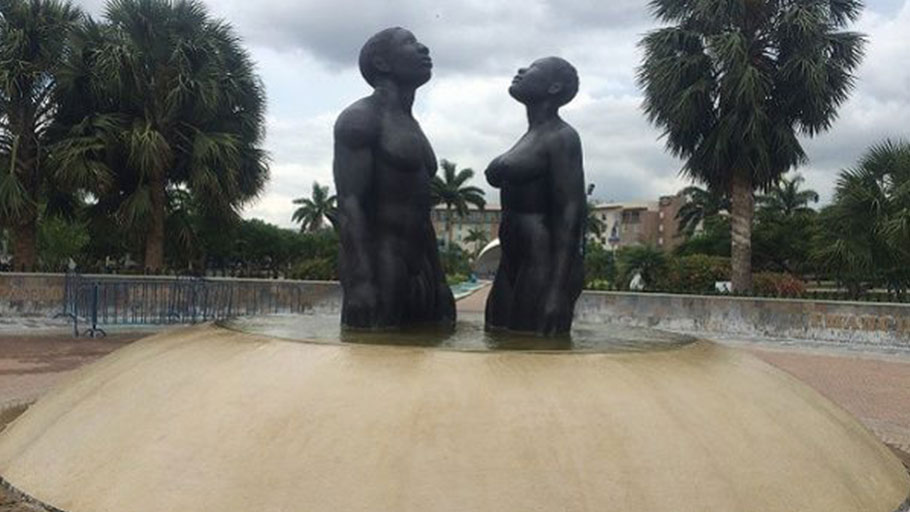A statue commemorating the struggle against slavery at Jamaica’s Emancipation Park in Kingston. Photo by Earl Bousquet
By Tina Renier —
“The presence of a group of African sell-outs is a part of the definition of underdevelopment.”- Walter Rodney
Last year, Professor Rupert Lewis, a prominent Caribbean intellectual, was invited to provide a teach-in session on anti-establishment strategies in the 1960s and 1970s at the University of the West Indies, Mona in Jamaica. In the introduction of his presentation, he posed a crucial question to the participants: what were the organizing principles of the nation?
While internalizing this question, I experienced a detailed flashback in my mind about discussions my grandfather have had with me about newly independent Jamaica. The popular notion of Jamaica is a small state poised by the radiance of the sunshine, lush vegetation, lovely white sand beaches, a vibrant culture and talented people- the ideal tropical paradise to the “outside world.”
On the other hand, my grandfather provided mixed accounts of hopes and sorrows similar to many in his generation who directly experienced Jamaica’s independence from Britain in 1962. He gave chilling accounts of growing up in poverty and having limited access to many social and economic privileges and labeled politics in Jamaica as “politricks.” In his opinion, various political leaders had deceived the Jamaican people and have failed to create an environment that would truly empower all citizens regardless of their differences especially the black and suffering majority.
Nevertheless, he also spoke about the feeling of satisfaction despite the fact that he didn’t achieve material wealth or higher education. These accounts have fuelled me to search deft, alternative knowledge in order to enhance my awareness and the awareness of others and most importantly, to effectively respond to Lewis’ question that was posed last year.First, when we use the word ‘post-colonialism’ to describe independent Jamaica, we are actually accepting an unchallenged myth because there is nothing ‘post’ about ‘post-colonialism’.
The prefix ‘post’ means subsequent to and, colonialism is not a process that has officially ended merely through an annual celebration. Colonialism is an institutionalized, historical process that has had long, crippling effects on the construction of race, social class, skin color, geographic location, gender and sexual orientation in Jamaica. It has also evolved beyond the occupation of territory, physical, psychological mistreatment as well as torture and genocide of our African ancestors.Therefore, the nation, as a concept, in the context of independence is a fictitious concept because colonialism persisted after 1962. Helen C. Scott (2006) challenged post-colonial thought in her book, ‘Caribbean Women Writers: Fictions of Independence’ by arguing, “new methods of foreign control have replaced formal colonialism, making a mockery of independence in any genuine sense.”
Scott’s criticism about independence is timeless because independence is a process that charades in liberation, self-determination, and inclusion of the masses but the fact of the matter is that, independence has not revolutionized the landscape of Jamaica. Consequently, the organizing principles of the nation were conformity and maintaining the self-interests of the political and economic elite. The suffering majority were and continue to be excluded from the concept of ‘nation’ because the ownership of wealth and production determines who charts the political path of Jamaica.
One’s personhood and self-worth in independent Jamaica can be summarized using this statement, ‘to be is to have.’Secondly, the late Professor of Economics Norman Girvan (2015) lamented on the fact that the Constitution of Jamaica did not actively involve mass participation and inclusion of the Jamaican people in its framework and implementation but rather a few wealthy landowners and members of the political parties along with British officials. He noted that the language of the Constitution did not reflect the peculiar experiences of the nation and its people and by extension; the original name of the Jamaican Constitution was the Royal Order in Council.
This validates the perspective that the plantation institution has remained tightly intact but has been replaced by new colonial masters who are tied to the values of external forces rather than the aspirations of their local citizenry. This is what led Louis Lindsay in 1975 to postulate that independence served more of a legalistic and ritualistic function rather than a revolutionary function, because new leaders have bolstered the images and privileges from the ancient regime while the predicament of the masses have remained unchanged.
My grandfather’s satisfaction with his poverty was borne apathy towards a system that has been promising hope and prosperity for years but like drought, it never came, and he accepted his situation. Lewis’ question allowed me to have a deeper insight on the standpoint of the powerless and oppressed and the numerous factors that increase the vulnerabilities of Jamaicans living on the margins in a ‘free’ and ‘independent’ country while ‘irie’ images are flaunted on the basis of escape from the realities, resilience, and deception.















